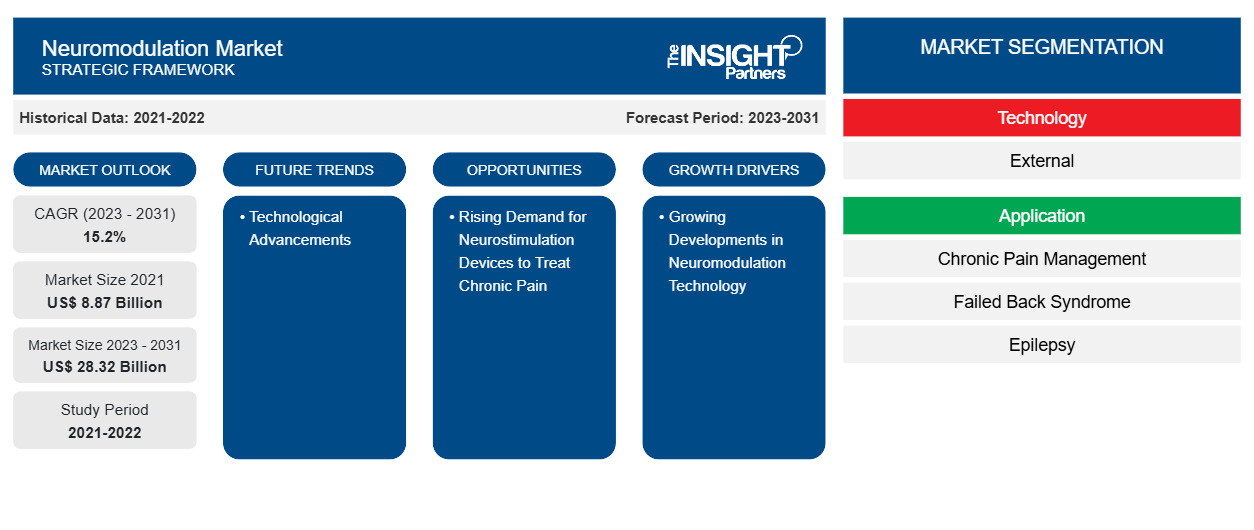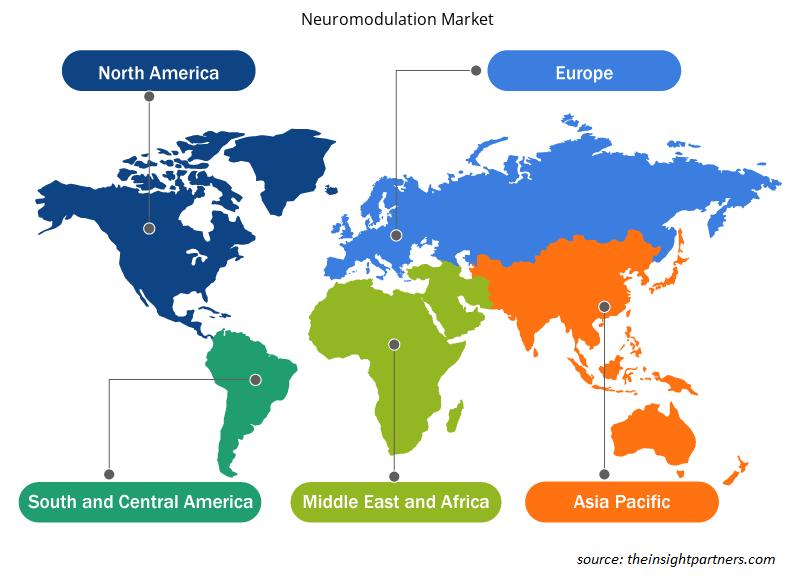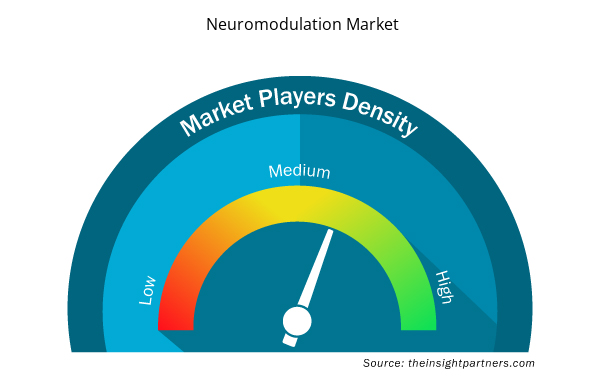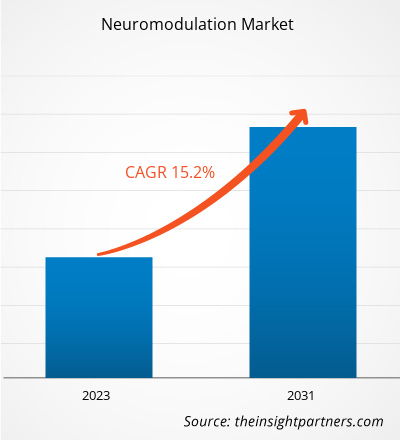The Neuromodulation market size was estimated to be US$ 8.87 billion in 2021 and US$ XX billion in 2023 and is expected to reach US$ 28.32 billion by 2031; it is estimated to record a CAGR of 15.2% in 2023–2031. The increasing incidence of neurological disorders and growing developments in neuromodulation technology are driving factors. Technological advancements will likely remain key neuromodulation market trends.
Neuromodulation Market Analysis
Neuromodulation devices contain small electrodes on the spinal cord, brain, or peripheral nerves. Neurological disorders such as cerebrovascular diseases, Parkinson's disease, and Alzheimer's disease impact the neurological functioning of the body and hence can be cured with the help of neuromodulation. Furthermore, there are growing developments by medical device companies in neuromodulation and increasing training programs to treat neurological disorders. For instance, in December 2023, a training program on neuromodulation techniques in mental health by the Centre for Advanced Research and Excellence in Neuromodulation for medical professionals was launched at the AIIMS.
Neuromodulation Market Overview
North America is the largest market for neuromodulation. The growth is mainly driven by the incidences of neurological conditions such as Parkinson’s disease, epilepsy, Alzheimer’s disease, and depression, among others. For instance, as per the CDC, the people living with Alzheimer’s disease double up every 5 years of age 65 and by 2060 this number is expected to triple to 14 million people by 2060. Among all ethnic group, as compared to men, women are nearly two times more likely to be affected by Alzheimer's disease. Furthermore, among Americans aged 65 and older, Alzheimer’s remains the fifth-leading cause of death, due to which deaths from stroke, heart disease, and HIV have increased by more than 145% between 2000 and 2019.
Customize This Report To Suit Your Requirement
You will get customization on any report - free of charge - including parts of this report, or country-level analysis, Excel Data pack, as well as avail great offers and discounts for start-ups & universities
Neuromodulation Market: Strategic Insights

- Get Top Key Market Trends of this report.This FREE sample will include data analysis, ranging from market trends to estimates and forecasts.
Customize This Report To Suit Your Requirement
You will get customization on any report - free of charge - including parts of this report, or country-level analysis, Excel Data pack, as well as avail great offers and discounts for start-ups & universities
Neuromodulation Market: Strategic Insights

- Get Top Key Market Trends of this report.This FREE sample will include data analysis, ranging from market trends to estimates and forecasts.
Neuromodulation Market Drivers and Opportunities
Growing Developments in Neuromodulation Technology
Neuromodulators alter nerve activity by precisely delivering electrical or pharmaceutical agents at the target site. These are repeatedly used for chronic pain relief and growing technological has increased its applications. For instance, in November 2022, CVRx launched a new neuromodulation device to treat heart failure. This neuromodulation device treats the symptoms of heart failure, a new Barostim NEO2 implantable pulse generator (IPG). This second-generation reduces the size of the IPG by 10% and widens battery life by 20%, thus reducing the device frequency replacements for patients and their providers. Furthermore, in April 2021, Medtronic announced the FDA approval to proceed with an investigational device exemption (IDE) trial to gauge its internally developed implantable tibial neuromodulation (TNM) device, a therapy intended to deliver relief from symptoms of bladder incontinence.
Rising Demand for Neurostimulation Devices to Treat Chronic Pain – An Opportunity
The demand for pain management devices is growing among the elderly and people who have osteoporosis, rheumatoid arthritis, and other such conditions. NCBI research states that in India, almost 61 million people have osteoporosis and out of these, 80% are women. The peak incidence of osteoporosis in India occurs 10–20 years earlier than in Western countries. Such diseases are demanding neurostimulation devices to treat pain.
Furthermore, several startups are designing devices with a prime focus on neurostimulation therapy. During the therapy, these devices deliver electrical stimulation to the spinal cord, dorsal root ganglion, and brain that helps relax muscles and reduce pain. Thus, the advantages of neurostimulation therapy have encouraged the development of enhanced products in the neuromodulation market.
Adoptions of neuromodulation devices have increased significantly across various North American, European, and Asian countries.
Neuromodulation Market Report Segmentation Analysis
Key segments that contributed to the derivation of the neuromodulation market analysis are technology, application, and distribution channels.
- Based on technology, the neuromodulation market is divided into external (non-invasive) neuromodulation and internal neuromodulation. External neuromodulation is further sub-segmented as respiratory electrical stimulation (RES), transcutaneous electrical nerve stimulation (TENS), and transcranial magnetic stimulation (TMS). In addition, the internal neuromodulation segment is also sub-segmented as deep brain stimulation (DBS), sacral nerve stimulation (SNS), gastric electrical stimulation (GES), spinal cord stimulation (SCS), and vagus nerve stimulation (VNS). The internal neuromodulation segment held a larger market share in 2023.
- Based on application, the neuromodulation market is divided into depression, dystonia, chronic pain management, failed back syndrome, Parkinson’s disease, epilepsy, tremor, incontinence, gastroparesis, obsessive-compulsive disorder (OCD), and migraine. The chronic pain management segment held a larger market share in 2023.
- Based on the end user, the neuromodulation market is segmented into hospitals, clinics, and home healthcare. The hospitals segment held a larger market share in 2023.
Neuromodulation Market Share Analysis by Geography
The geographic scope of the Neuromodulation market report is mainly divided into five regions: North America, Asia Pacific, Europe, Middle East & Africa, and South America/South & Central America.
North America has dominated the neuromodulation market. The market's growth is attributed to increasing developments in the medical device sector for neuromodulation, rising incidences of neurological disorders among people, and mounting demand for neuromodulation devices for chronic pain management. In addition, the economic burden of treating neurological disorders is significantly growing in the country. Asia Pacific is anticipated to grow with the highest CAGR in the coming years.
Neuromodulation Market Regional Insights
The regional trends and factors influencing the Neuromodulation Market throughout the forecast period have been thoroughly explained by the analysts at Insight Partners. This section also discusses Neuromodulation Market segments and geography across North America, Europe, Asia Pacific, Middle East and Africa, and South and Central America.

- Get the Regional Specific Data for Neuromodulation Market
Neuromodulation Market Report Scope
| Report Attribute | Details |
|---|---|
| Market size in 2021 | US$ 8.87 Billion |
| Market Size by 2031 | US$ 28.32 Billion |
| Global CAGR (2023 - 2031) | 15.2% |
| Historical Data | 2021-2022 |
| Forecast period | 2023-2031 |
| Segments Covered |
By Technology
|
| Regions and Countries Covered | North America
|
| Market leaders and key company profiles |
Neuromodulation Market Players Density: Understanding Its Impact on Business Dynamics
The Neuromodulation Market market is growing rapidly, driven by increasing end-user demand due to factors such as evolving consumer preferences, technological advancements, and greater awareness of the product's benefits. As demand rises, businesses are expanding their offerings, innovating to meet consumer needs, and capitalizing on emerging trends, which further fuels market growth.
Market players density refers to the distribution of firms or companies operating within a particular market or industry. It indicates how many competitors (market players) are present in a given market space relative to its size or total market value.
Major Companies operating in the Neuromodulation Market are:
- Abbott,
- Boston Scientific Corporation,
- Medtronic,
- NeuroPace, Inc.,
- NeuroSigma, Inc.,
- NEVRO CORP.,
Disclaimer: The companies listed above are not ranked in any particular order.

- Get the Neuromodulation Market top key players overview
Neuromodulation Market News and Recent Developments
The neuromodulation market is evaluated by gathering qualitative and quantitative data from primary and secondary research, which includes important corporate publications, association data, and databases. The following is a list of developments in the market for neuromodulation:
- The U.S. Food and Drug Administration (FDA) approved Abbott's Eterna spinal cord stimulation (SCS) system for treating chronic pain. This device provides an improved experience with the ability to wirelessly charge as few as five times per year, the lowest recharge burden compared to other rechargeable SCS systems. (Source: Abbott /Press Release, December 2022)
- GrayMatters Health, a developer of digital self-neuromodulation therapies for mental health care, announced the launch of Prism for posttraumatic stress disorder (PTSD) in the United States. Prism for PTSD is the first self-neuromodulation device to receive U.S. Food & Drug Administration (FDA) clearance as a prescribed adjunct to standard of care (SOC) for PTSD and is accessible at 2 U.S. clinics. (Source: GrayMatters Health, Press Release, January 2024)
Neuromodulation Market Report Coverage and Deliverables
The “Neuromodulation Market Size and Forecast (2021–2031)” report provides a detailed analysis of the market covering below areas:
- Market size and forecast at global, regional, and country levels for all the key market segments covered under the scope
- Market dynamics such as drivers, restraints, and key opportunities
- Key future trends
- Detailed PEST/Porter’s Five Forces and SWOT analysis
- Global and regional market analysis covering key market trends, major players, regulations, and recent market developments
- Industry landscape and competition analysis covering market concentration, heat map analysis, prominent players, and recent developments
- Detailed company profiles
- Historical Analysis (2 Years), Base Year, Forecast (7 Years) with CAGR
- PEST and SWOT Analysis
- Market Size Value / Volume - Global, Regional, Country
- Industry and Competitive Landscape
- Excel Dataset



Report Coverage
Revenue forecast, Company Analysis, Industry landscape, Growth factors, and Trends

Segment Covered
Technology Neuromodulation ; Application (Chronic Pain Management, Failed Back Syndrome, Epilepsy, Tremor, Incontinence, Depression, Dystonia, Gastroparesis, Parkinson

Regional Scope
North America, Europe, Asia Pacific, Middle East & Africa, South & Central America

Country Scope
Argentina, Australia, Brazil, Canada, China, France, Germany, India, Italy, Japan, Mexico, Saudi Arabia, South Africa, South Korea, Spain, United Arab Emirates, United Kingdom, United States

 Get Free Sample For
Get Free Sample For